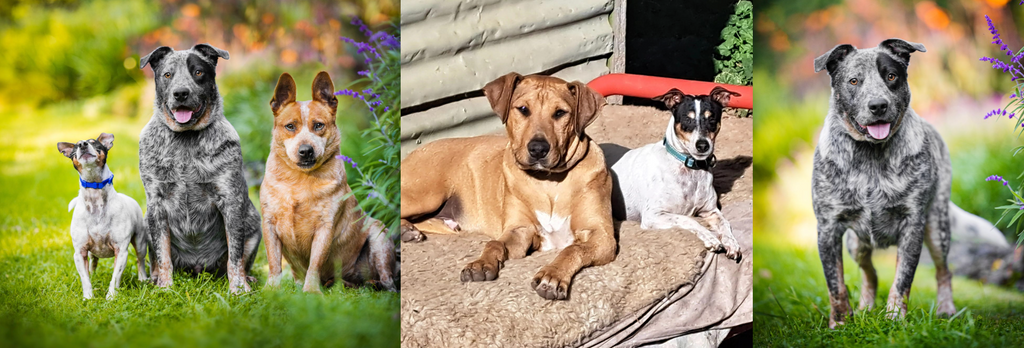
Why some dogs have chicken allergies
Have you seen your dog scratching a lot or having a bad stomach after eating?
It might not just be them being picky. It could show they're allergic to something in their food. Often, this problem is due to chicken allergies. Knowing about these allergies is the first step in finding the right food for your dog's needs.
Dogs can get food allergies just like humans, with proteins often causing the trouble. Chicken is one of the most common causes. It's important to figure out why chicken might be a problem. This understanding helps you choose the best food for your dog's health.

Key Takeaways
- Dog allergies can show up as skin problems or stomach issues.
- Chicken is a common allergen that affects some dogs badly.
- Choosing the right hypoallergenic food is crucial for dealing with chicken allergies.
- To understand dog allergies, it's essential to know about their immune system's response to allergens.
- Knowing the symptoms and talking to a vet can help make your dog's life better.
Understanding Dog Allergies: An Overview
Keeping an eye on your dog's health includes watching out for dog food allergies. These allergies happen when the immune system overreacts. Let's uncover the secrets of dog allergies and how you can help your furry friend.
Common Triggers of Dog Allergies
Dogs, like humans, often face allergies. Foods are common culprits behind these reactions. They can hurt your pet's life quality. Things like pollen and flea bites also cause issues, but foods like beef and wheat top the list.
How a Dog's Immune System Reacts to Allergens
Allergies start when a dog's body wrongly attacks a food protein. This error can lead to skin problems or upset stomachs. It's important to know how proteins in the diet affect your dog's health.
The Difference Between Food Allergies and Intolerances in Dogs
It's crucial to know the difference between food allergies and intolerances. Intolerances deal with digestion, like upset stomachs, and don't involve the immune system. On the other hand, food allergies can cause many symptoms and need careful diet changes.
This knowledge helps manage symptoms and lead to a happier pet. Being informed lets you work better with your vet on your dog's diet and health plan.

Chicken Allergies in Dogs: The Signs and Symptoms
If your dog starts showing weird signs after meals, they might have a chicken allergy. Knowing these signs and possible allergic reactions helps you care for your dog. It helps you know when to seek a vet for allergy advice.
Recognizing Allergic Reactions to Chicken
Dogs can react to chicken in many ways. It's key to watch for any changes, especially after chicken meals. Skin irritations like hives, upset stomachs, or paw licking are common allergy signs.
Behavioural Changes and Physical Symptoms
Behaviour changes can be an early warning. If your dog is tired, off food, or acting upset, check their diet for chicken. Chronic ear problems, bad coat quality, and lots of scratching could mean an allergy.
When to Consult a Vet over Allergy Concerns
Some dog allergies can be handled at home, but some signs mean you should see a vet. Here are key points for deciding:
| Sign/Symptom | Home Management | Consult Vet |
|---|---|---|
| Itching and scratching | Possible with mild cases | Yes, if persistent or severe |
| Digestive upset | Yes, moderate changes in diet | Yes, if symptoms are recurrent |
| Respiratory issues | Yes, if minor and infrequent | Immediately for difficulty breathing |
| Behavioral changes | Monitor closely | Yes, if accompanied by other symptoms |
It's best to check with your vet if unsure. They'll properly diagnose and plan the best treatment for your pet.
Why Chicken Specifically Causes Allergies in Some Dogs
Many dog owners have noticed that chicken as an allergen is a growing concern. It makes them wonder about the causes of chicken allergies in dogs. Proteins are often the main issue in food allergies. Since chicken is rich in proteins, it tends to set off the immune system in some dogs.
One reason for the spike in chicken allergies could be its popularity in dog food. Chicken is cheap and nutritious, so it's found in lots of dog meals. If a dog eats chicken often, they might develop an allergy to it over time. Also, if a dog is naturally more likely to get allergies, chicken protein could be a big problem for them.
- Widespread use of chicken in commercial dog food – leading to increased exposure and sensitisation.
- Inherited traits – some breeds are naturally more prone to allergies.
- Chicken protein structure – may be more reactive with certain canine immune systems.
Causes of chicken allergies are good to know so you can see if your dog might have an issue. If your pet doesn't do well with chicken, talking to a vet is key. They'll help you figure out what to do.
| Allergen Exposure | Genetic Factors | Protein Reactivity |
|---|---|---|
| High frequency in dog food | Breed-specific predispositions | Chicken protein properties |
The Role of Chicken in Commercial Dog Foods
As you walk through the pet food section, chicken in dog food stands out. It's a key commercial dog food ingredient. Chicken is valued not only for its premium protein but also for its vitamins and minerals that support your dog's health.
Chicken is widely used because it's affordable and easy to find. This makes it a primary protein choice for many pet food makers. But, this can be tough for dog owners searching for chicken free dog food. Finding alternatives is important for dogs with chicken allergies.
“Checking pet food labels is key to maintaining your dog's health, especially with a chicken allergy. Always look beyond the packaging and examine the ingredient list in detail.”
Chicken is popular in dog food for its muscle-building and energy-boosting benefits. Yet, some dogs can't eat chicken without having a bad reaction due to allergies. This makes reading food labels more important than ever.
- Search for hidden chicken sources like "poultry meal" or "chicken flavour".
- Opt for "limited ingredients" foods to steer clear of chicken.
- Choose brands known for hypoallergenic formulas.
When finding alternatives, talk to your vet to match your dog's dietary needs. Finding the right chicken free food may seem hard, but many excellent options will keep your dog healthy and content.
Chicken Free Dog Food: An Alternative for Allergic Dogs
If your dog seems unhappy with their food, think about chicken free dog food. It's great for dogs with food problems. Also, it has many health benefits your buddy might not get otherwise.
Benefits of Chicken Free Options
Chicken free dog food is a big relief for dogs with allergies. It stops allergies and makes your dog healthier. Plus, it has different proteins to keep your dog strong and happy.
Healthy Active Pet’s Unique Chicken Free Recipe
Healthy Active Pet has a special freeze-dried food that's high-quality and varied. It includes turkey, salmon, and beef organs. This mix is not only tasty but also full of needed nutrients. Freeze-drying keeps the food fresh and easy to handle.
See the chicken free dog food here

Why Variety is Vital in a Dog's Diet
Nutritional variety in dog diets matters a lot. That's what Healthy Active Pet focuses on. Including various proteins ensures your pet eats like their wild ancestors. This is key for the best health of your furry friend.
Transitioning Your Dog to a Chicken Free Diet
When your furry mate gets a chicken allergy, it's key to switch to a hypoallergenic dog food. Making this switch smoothly helps reduce symptoms and boosts your pooch's energy. Here's how to make it work well.
Navigating the Switch to Hypoallergenic Foods
Change your dog's diet slowly. Begin by mixing a little hypoallergenic food with their usual food. Gradually increase the hypoallergenic food over two weeks. This method reduces stomach upset and lets your dog get used to new tastes.
Monitoring Your Dog's Health During Diet Changes
Watch your dog’s health as you try new foods. Look for better allergy symptoms, but keep an eye out for bad reactions too. If your dog seems tired, has stomach issues, or itches a lot, see your vet. They'll figure out if these are adjustment troubles or if a different food might be better.
Advice for a Balanced Chicken Free Meal Plan
A balanced diet without chicken includes more than just protein. It should have fats, carbs, vitamins, and minerals. Check this table to see what a good chicken-free meal contains:
| Nutrient | Functions | Hypoallergenic Sources |
|---|---|---|
| Protein | Builds and repairs tissues, supports immune function | Lamb, salmon, venison |
| Fats | Provides energy, supports cell growth, protects organs | Flaxseed oil, fish oil, canola oil |
| Vitamins & Minerals | Various roles in body functions, from bone health to blood clotting | Fruits, vegetables, specialized hypoallergenic supplements |
As you change your dog's diet, always provide fresh water and regular exercise. These steps help your dog stay healthy and adjust to a hypoallergenic diet.
See the chicken free dog food here

Nutritional Considerations for Chicken Allergic Dogs
Finding the right food for a dog with a chicken allergy can seem tough. But, it's essential to give them a hypoallergenic dog diet that’s healthy and safe. While chicken is often found in dog food, there are many other proteins and nutrients for a balanced diet.
Here are some non-chicken protein sources for your pup:
- Lamb
- Beef
- Salmon
- Venison
- Duck
Beyond proteins, dogs with chicken allergies also need lots of vitamins and minerals. Below is a table showing the nutritional value of different protein options for a hypoallergenic diet:
| Protein Source | Vitamin A | Vitamin D | Omega-3 Fatty Acids | Iron |
|---|---|---|---|---|
| Lamb | High | Moderate | Low | High |
| Beef | Moderate | Moderate | Low | Very High |
| Salmon | Low | Very High | Very High | Low |
| Venison | Moderate | Low | Moderate | High |
| Duck | High | Low | Moderate | High |
Some people worry that a hypoallergenic dog diet might not offer enough variety or proper nutrition. However, with the right planning and knowledge about nutritional needs for allergic dogs, you can ensure a safe, healthy diet. By learning about the many options available, you can make your dog's meals both tasty and free from allergens.
Diagnosing Chicken Allergies: The Process
Figuring out food allergies in dogs, especially chicken allergies, needs a clear and step-by-step process. It relies on the vet's know-how and your careful watch over your dog's diet. Together, these steps help find out what's troubling your furry mate.
What to Expect During an Allergy Test
Allergy testing for dogs is usually simple. The vet might do skin or blood tests to check for a chicken protein allergy. These tests look at how your dog's immune system responds to different foods, showing what causes the allergic reactions.
Elimination Diets and Identifying the Culprit
Using an elimination diet is one of the best ways to spot food allergies. You stop feeding your dog chicken and other common allergy foods, then slowly bring them back into the diet. This method needs patience and close observation. But it's essential for finding the cause of allergies.
Living with a Chicken Allergic Dog
When your pet is allergic to chicken, it's important to create a safe space for them. Making a hypoallergenic home helps protect your dog from allergies. It also makes their life better. Let’s look at how to manage these allergies and keep up with the care they need.
Long-Term Management of Chicken Allergies
Managing allergies in dogs takes effort and planning. You need to work with a vet for a care plan that lasts. This plan should have regular vet visits and diet changes if new allergies or health issues pop up. Watching how your dog reacts to food is key for their health.
Creating a Safe Environment for Your Pet
To make a hypoallergenic space, check that all dog food, treats, and toys have no chicken in them. Keeping allergies in check means always reading labels carefully. Being mindful of ingredients helps avoid chicken from sneaking back into your dog’s space. Below are some steps to help:
- Check the ingredients in your pet’s food and treats.
- Change any pet items that might touch chicken products.
- Clean where your dog lives often to keep chicken products away.
The Importance of Consistency in Allergy Management
Being consistent is vital in allergy care. Everyone in your home needs to understand what your dog can and can't eat. This helps avoid mistakes. Regular talks and checks are good for keeping everyone informed. Make a list of do's and don'ts for everyone to see:
| Safe Items | Unsafe Items |
|---|---|
| Hypoallergenic treats | Chicken-flavored toys |
| Beef or plant-based chews | Items cleaned with chicken broth |
| Non-poultry based dog food | Human food with chicken |
Dealing with a chicken allergic dog requires patience and effort. But, with the right care, your dog can live a joyful life. By setting up a clear allergy plan and creating a hypoallergenic home, you’re helping your dog stay healthy and happy.
Conclusion
In our look at chicken allergies in dogs, we've learned that knowledge, patience, and the right steps are key. If your dog has these allergies, know that they can still have a great life. The journey may seem tough at first, but with close watch and changing their diet, you can manage it.
Choosing a hypoallergenic dog food is important. It's more than a need; it's a way to give your dog loads of benefits. A diet without chicken helps stop bad reactions and supports their health with top-notch proteins. Being proactive about your dog's allergies keeps them happy and well.
To sum up, keeping a close eye on what your dog eats is super important. With help from vets and the right hypoallergenic food, your dog can avoid allergy troubles. By making smart choices, you can give your dog a lively and happy life, turning their diet limits into just a tiny part of their happy years.
FAQ
Why are some dogs allergic to chicken?
Dogs can develop allergies to foods, including chicken. Their immune systems might see chicken protein as harmful. This can lead to allergic reactions because of genes or frequent exposure in dog foods.
What are the common triggers of dog allergies?
Dogs can be allergic to many things. These include beef, dairy, wheat, eggs, soy, pork, rabbit, and fish. Things in the environment like pollen, mold, dust mites, and flea bites can also cause allergies.
How can I tell if my dog has a food allergy or intolerance?
Food allergies can make a dog's skin itchy and cause ear infections or tummy troubles. On the other hand, food intolerances usually lead to vomiting and diarrhea, but without the skin problems.
What should I do if I suspect my dog has a chicken allergy?
If your dog is scratching a lot, has skin issues, or tummy problems, see your vet. They might suggest trying a special diet or doing tests to find out what's causing the allergy. Then, they'll recommend what to feed your dog or how to treat the allergy.
Why might my dog be specifically allergic to chicken?
Dogs can get allergic to chicken because it's in many dog foods, so they eat it a lot. This makes them more likely to develop an allergy, especially if they're already prone to allergies. Chicken is also high in protein, which is a common allergy trigger.
What are the implications of chicken as a common ingredient in dog food?
Chicken is used in dog food because it's cheap and dogs usually like it. But, for dogs allergic to chicken, finding the right food can be hard. It's important to check food labels and look for options without chicken.
Are there any benefits of feeding my dog chicken free dog food?
Chicken free dog food is good for dogs with chicken allergies or intolerances. It avoids allergic reactions and offers different nutrients and proteins that chicken-based foods might not have.
How do I transition my dog to a chicken free diet?
Start by slowly mixing more of the new, chicken free food with their current food. Do this over a few days to avoid upsetting their stomach. Watch how your dog reacts to the new food to make sure they're okay with it.
What nutritional considerations are there for dogs with chicken allergies?
Dogs allergic to chicken need other sources of protein, like beef, lamb, fish, or plants. Make sure the food without chicken still has everything your dog needs to stay healthy.
How are chicken allergies in dogs diagnosed?
To find out if a dog is allergic to chicken, vets use an elimination diet. They stop feeding the dog certain foods and watch if symptoms improve. Then, they slowly add each food back to see which one causes a problem. Sometimes, vets also do special allergy tests.
What are some long-term management strategies for chicken allergies in dogs?
Keep feeding your dog food without chicken and watch out for chicken in treats or other foods. Always double-check food labels as ingredients can change. Regular check-ups with the vet can help keep your dog healthy and happy.
See the chicken free dog food here



